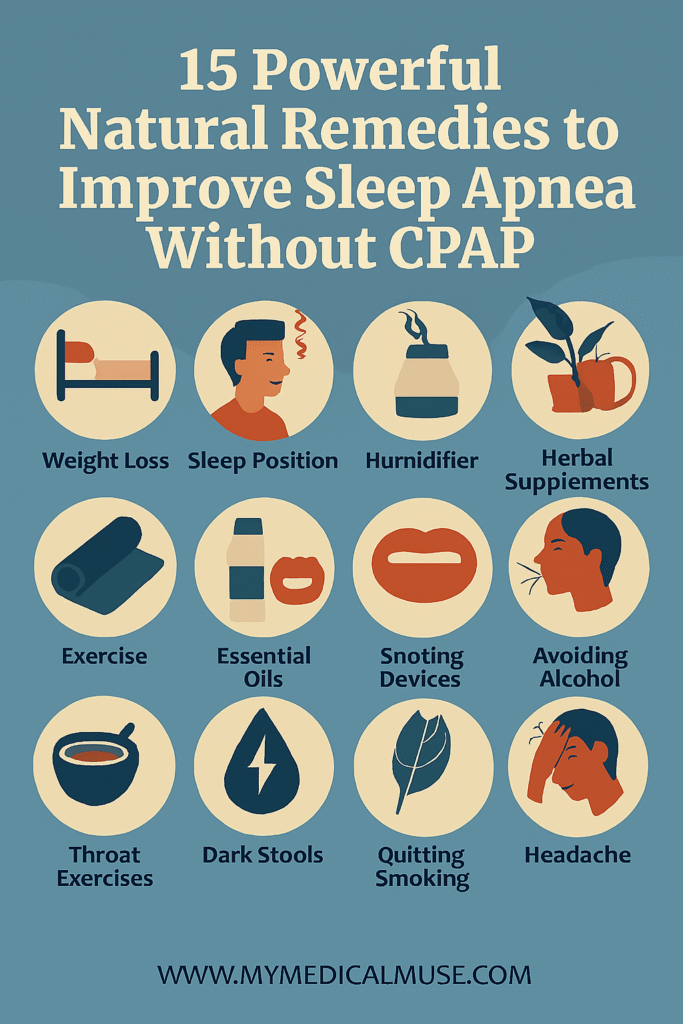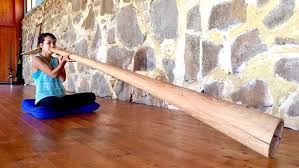
⚠️ Affiliate Disclaimer: This post may contain affiliate links, which means I may earn a small commission — at no extra cost to you — if you make a purchase through one of these links. I only recommend products or services I genuinely trust and believe can provide value. Thank you for supporting My Medical Muse!
15 Powerful Natural Remedies to Improve Sleep Apnea Without CPAP
Waking up exhausted after what should have been a full night’s sleep is not normal. Loud snoring, gasping for air, or feeling unrested every morning are often signs that your breathing is being interrupted at night. For many people, this points to sleep apnea.
Sleep apnea is a common but often overlooked sleep disorder that quietly strains the heart, brain, and metabolism over time. While medical treatment is essential for moderate to severe cases, research shows that targeted lifestyle changes and natural home-based strategies can significantly improve symptoms, especially in mild to moderate sleep apnea.
In this article, you will discover 15 science-backed, practical remedies you can start using at home to support your airway, improve nighttime breathing, reduce snoring, and wake up feeling genuinely rested.
What Is Sleep Apnea?
Sleep apnea is a serious sleep-related breathing disorder in which breathing repeatedly stops and starts during sleep. These pauses in breathing can last from a few seconds to over a minute and may occur dozens or even hundreds of times per night. Each episode briefly lowers oxygen levels and forces the brain to partially wake the body to restart breathing, often without the person realizing it.
The most common form is Obstructive Sleep Apnea (OSA). OSA occurs when the muscles at the back of the throat relax excessively during sleep, causing the airway to narrow or collapse. This blockage prevents adequate airflow despite continued breathing effort. Less common forms include central sleep apnea, where the brain fails to send proper signals to breathe, and complex sleep apnea, which is a combination of both.
Over time, untreated sleep apnea places significant strain on the cardiovascular and nervous systems, increasing the risk of high blood pressure, heart disease, stroke, insulin resistance, and cognitive impairment.
Common Symptoms of Sleep Apnea
Sleep apnea symptoms often develop gradually and may go unnoticed for years. Common warning signs include:
Loud, chronic snoring
Gasping, choking, or snorting sounds during sleep
Excessive daytime fatigue or sleepiness
Morning headaches or dry mouth
Irritability, anxiety, or low mood
Difficulty concentrating or memory problems
Because many symptoms occur during sleep, partners are often the first to notice the problem.
Why Natural Remedies Matter
CPAP therapy, oral appliances, and surgical options remain the most effective treatments for moderate to severe sleep apnea. However, many people struggle with long-term adherence to these treatments due to discomfort, inconvenience, or side effects.
Research shows that lifestyle changes and targeted home-based strategies can significantly reduce symptom severity, particularly in mild to moderate cases of obstructive sleep apnea. These natural approaches work by addressing underlying contributors such as excess weight, airway muscle weakness, inflammation, nasal obstruction, poor sleep posture, and disrupted sleep rhythms.
When used alongside medical treatment, natural remedies can improve treatment tolerance, reduce apnea events, enhance sleep quality, and support overall health. For some individuals with early or mild disease, they may even delay progression.
Understanding and applying these strategies empowers you to take an active role in managing sleep apnea rather than relying on devices alone.
Now, let’s explore the science-backed ways you can start improving your breathing and sleep quality at home.
15 Natural Remedies to Improve Sleep Apnea Symptoms at Home
1. Lose Excess Weight
Excess body weight is one of the most powerful and well-established risk factors for obstructive sleep apnea. Fat accumulation around the neck, tongue, and upper airway increases pressure on the throat, making it more likely to collapse during sleep.
Clinical studies consistently show that losing even 5 to 10 percent of body weight can lead to a noticeable reduction in apnea episodes, snoring intensity, and daytime fatigue.
The most effective approach is gradual, sustainable weight loss:
Follow an anti-inflammatory eating pattern such as the Mediterranean diet
Combine aerobic exercise with strength training 3 to 5 times per week
Avoid extreme calorie restriction, which can worsen sleep quality and hormone balance
2. Sleep on Your Side Instead of Your Back
Sleeping on your back allows gravity to pull the tongue and soft tissues toward the back of the throat, narrowing the airway. Side sleeping keeps the airway more stable and reduces breathing interruptions.
Simple ways to stay off your back include:
Using a full-length body pillow for support
Wearing a positional therapy device
Placing a tennis ball in the back of your sleep shirt to discourage rolling
For many people with mild sleep apnea, positional therapy alone can significantly reduce symptoms.
3. Elevate Your Head While Sleeping
Slight head elevation helps prevent airway collapse by improving airflow and reducing pressure on the throat.
Effective methods include:
Using a wedge pillow designed for airway support
Raising the head of the bed by a few inches
Avoiding stacked soft pillows that flex the neck unnaturally
This strategy is especially helpful for people who experience apnea alongside acid reflux or nasal congestion.
4. Avoid Alcohol and Sedatives Before Bed
Alcohol, sleeping pills, and sedative medications relax throat muscles and suppress breathing reflexes, making airway obstruction more likely.
To reduce risk:
Avoid alcohol at least 3 to 4 hours before sleep.
Use non-sedating relaxation techniques instead.
Choose calming herbal teas such as chamomile or lemon balm.
Reducing evening alcohol intake alone can noticeably improve snoring and breathing quality.
5. Strengthen Airway Muscles With Mouth and Throat Exercises
The muscles that keep your airway open can weaken over time. Targeted oropharyngeal exercises strengthen the tongue, soft palate, and throat, reducing airway collapse.
Research shows these exercises can significantly reduce snoring and improve mild to moderate sleep apnea.
Examples include:
Sliding the tongue along the roof of the mouth
Pronouncing vowel sounds forcefully and slowly
Singing or playing wind instruments such as the didgeridoo
Just 10 minutes of daily practice can lead to measurable improvements within a few months.
6. Clear Nasal Congestion Naturally
Blocked nasal passages increase breathing resistance and worsen nighttime airway collapse.
Natural strategies that improve nasal airflow include:
Saline sprays or nasal rinses with a neti pot
Steam inhalation before bed
Diffusing eucalyptus or peppermint oil
Reducing bedroom allergens like dust mites and pet dander also helps prevent chronic nasal swelling.
7. Use a Humidifier in Your Bedroom
Dry air irritates the throat and nasal lining, increasing inflammation and snoring.
A clean, well-maintained humidifier can:
Keep airway tissues moist
Reduce nasal congestion
Improve breathing comfort during sleep
Always clean the device regularly to prevent mold and bacterial buildup.
8. Maintain a Consistent Sleep Schedule
Irregular sleep patterns disrupt breathing stability and worsen sleep apnea severity.
A consistent schedule:
Supports healthy circadian rhythms
Improves sleep depth and efficiency
Reduces nighttime awakenings
Aim to go to bed and wake up at the same time every day, even on weekends.
9. Increase Magnesium Intake
Magnesium supports muscle relaxation, nervous system balance, and sleep quality. Low levels may contribute to nighttime muscle tension and fragmented sleep.
Good dietary sources include:
Leafy greens such as spinach
Pumpkin seeds and almonds
Dark chocolate in moderation
Always consult a healthcare provider before starting supplements, particularly if you take medications.
10. Practice Deep Breathing or Meditation Before Bed
Stress increases muscle tension and disrupts sleep architecture, both of which worsen sleep apnea symptoms.
Effective relaxation techniques include:
Diaphragmatic breathing
The 4-7-8 breathing method
Guided meditation or body scan exercises
Practicing these techniques regularly improves sleep quality and reduces nighttime arousals.
11. Reduce Airway Inflammation Through Diet
Inflamed airway tissues are more prone to swelling and collapse during sleep.
An anti-inflammatory diet emphasizes:
Fatty fish such as salmon
Berries and leafy greens
Turmeric, ginger, and garlic
Limiting sugar, refined carbohydrates, and ultra-processed foods helps control chronic inflammation.
12. Stop Smoking
Smoking irritates the upper airway, increases mucus production, and worsens inflammation.
Quitting smoking:
Reduces throat swelling
Improves oxygen levels
Enhances sleep quality within weeks
Nicotine replacement therapies and structured cessation programs significantly improve success rates.
13. Use Essential Oils Carefully
Certain essential oils may help reduce nasal congestion and promote relaxation before sleep.
Effective options include:
Peppermint oil: Clears nasal passages and eases airflow
Eucalyptus oil: Reduces sinus inflammation and congestion
Lavender oil: Supports calmness and improves sleep quality
Use oils in a diffuser or diluted for topical application. Avoid using essential oils if you have asthma or allergies without consulting a healthcare provider.
14. Try Didgeridoo Therapy
It may sound unusual, but playing the didgeridoo, a traditional wind instrument can strengthen airway muscles and improve breathing control.
A 2006 study published in the British Medical Journal found that participants who practiced for 25 minutes daily reduced daytime sleepiness and improved sleep apnea severity.
The technique works by engaging the tongue, throat, and soft palate muscles while promoting continuous, controlled breathing.
15. Optimize Your Sleep Environment
The environment in which you sleep can significantly impact airway stability and overall sleep quality.
Simple ways to enhance your bedroom for better breathing include:
Keep the room dark, quiet, and cool
Use blackout curtains and white noise if needed
Remove electronics and other distractions from the bed area
Tracking sleep with apps or smart devices can help you monitor improvement and identify patterns that worsen symptoms.
Final Thoughts
Sleep apnea affects far more than your nights—it impacts your heart, brain, metabolism, and mood. Left unmanaged, it can quietly increase the risk of high blood pressure, diabetes, cognitive decline, and persistent fatigue. The encouraging truth is that you have more control than you might think. By combining natural strategies with medical guidance when needed, you can strengthen your airway, improve breathing, and finally reclaim restorative sleep.
Small, consistent changes can create a significant impact. Adjusting your sleep position, practicing daily breathing or throat exercises, improving nutrition, and maintaining consistent sleep habits may seem simple, but they directly influence airway stability, inflammation, and sleep quality. Over time, these habits don’t just reduce snoring or apnea—they help your body recover, restore energy, and support long-term health.
Even incremental improvements matter. Each positive step—from side sleeping to reducing alcohol intake or strengthening throat muscles—adds up, giving you better nights and more alert, energized days. For those with mild to moderate sleep apnea, these approaches can dramatically reduce symptoms. For everyone, they form a strong foundation alongside professional treatment for optimal outcomes.
Key Takeaways
Lifestyle changes matter: Weight loss, side sleeping, and positional therapy can meaningfully reduce apnea severity.
Airway-strengthening exercises work: Daily mouth and throat exercises show measurable benefits in both snoring and apnea events.
Diet and sleep hygiene are essential: Anti-inflammatory foods, regular sleep schedules, and avoiding alcohol or sedatives improve airway stability.
Consistency is key: Sustainable habits provide lasting improvements rather than temporary fixes.
Always consult a healthcare provider if symptoms persist, worsen, or interfere with your daily life. Early intervention is crucial, sleep apnea is manageable, and taking action today sets the stage for healthier nights and energized days ahead.
👩⚕️ Need Personalized Health Advice?
Get expert guidance tailored to your unique health concerns through MuseCare Consult. Our licensed doctors are here to help you understand your symptoms, medications, and lab results—confidentially and affordably.
👉 Book a MuseCare Consult NowRelated Post:
- 13 Sneaky Signs of Magnesium Deficiency in Women
- 10 Proven Ways Sleep Triggers Chronic Headaches (And How to Fix Them)
- 7 Shocking Reasons Why Sleeping Immediately After Eating Can Harm Your Health
- Is Sleeping with the Light On Bad for You? 7 Hidden Health Risks Explained
- Sleeping with AC or Heater: 7 Powerful Health Truths You Must Know
- 7 Proven Fixes for Neck Stiffness After Sleeping Wrong
Dr. Ijasusi Bamidele, MBBS (Binzhou Medical University, China), is a medical doctor with 5 years of clinical experience and founder of MyMedicalMuse.com, a subsidiary of Delimann Limited. As a health content writer for audiences in the USA, Canada, and Europe, Dr. Ijasusi helps readers understand complex health conditions, recognize why they have certain symptoms, and apply practical lifestyle modifications to improve well-being





